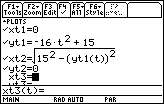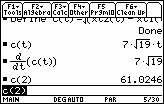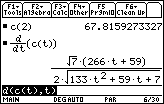



x(t) = 0
y(t) = 15 – 45t
x(t) = 24 – 52t
y(t) = 0
©Copyright 2007 All rights reserved. | Trademarks | Privacy Policy | Link Policy
| Module 14 - Answers |
| Lesson 1 |
| Answer 1 |
| 14.1.1 The bottom of the ladder moves at a constant rate of 3 ft/sec while the top of the ladder falls at an increasing rate. |
|
|
|
|
| Answer 2 |
|
14.1.2
|
|
|
|
|
| Answer 3 |
|
14.1.3
The velocity of the ladder's top is given by
|
|
|
|
|
| Answer 4 |
|
14.1.4
Solving yt2(t)=0 indicates that the top of the ladder hits the ground after 5 seconds, but
|
|
|
|
|
| Lesson 2 |
| Answer 1 |
|
14.2.1
The parametric equations that model the ladder's position at time t are shown in the screen below.
|
|
|
|
|
| Answer 2 |
| 14.2.2 The top of the ladder is falling at an increasing rate while the bottom is moving at a decreasing rate. |
|
|
|
|
| Answer 3 |
| 14.2.3 Using the derivative of the position of the bottom of the ladder, xt2(t), and evaluating it at the given times, the bottom is moving at approximately 21.2015 ft/sec, 17.2582 ft/sec, and 8.5665 ft/sec, respectively. |
|
|
|
|
| Lesson 3 |
| Answer 1 |
|
14.3.1
About 61.0 nautical miles.
|
|
|
|
|
| Answer 2 |
|
14.3.2
|
|
|
|
|
| Self Test |
| Answer 1 |
|
x(t) = 0 y(t) = 15 – 45t |
| Answer 2 |
|
x(t) = 24 – 52t y(t) = 0 |
| Answer 3 |
| The car coming from the North will arrive at the intersection first. |
| Answer 4 |
|
Define
|
| Answer 5 |
|
|
|
|
|
©Copyright 2007 All rights reserved. | Trademarks | Privacy Policy | Link Policy |